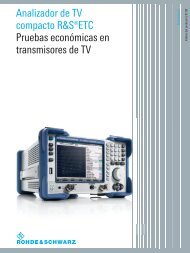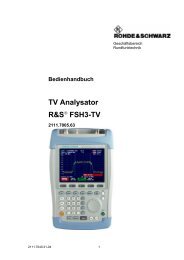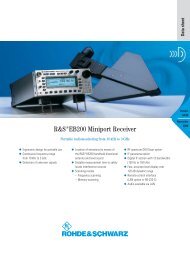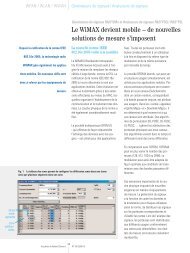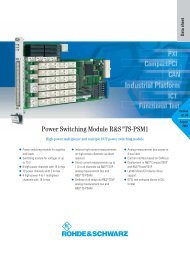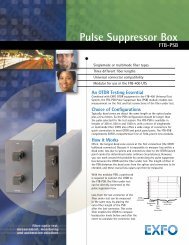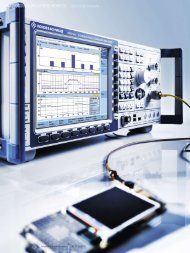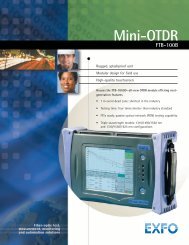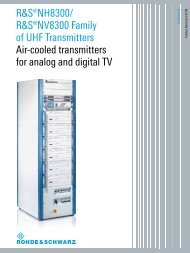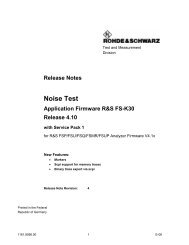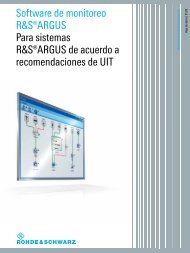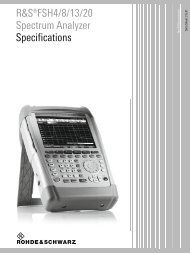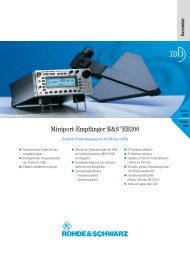Top Ten SCPI Programming Tips for Signal Generators - Rohde ...
Top Ten SCPI Programming Tips for Signal Generators - Rohde ...
Top Ten SCPI Programming Tips for Signal Generators - Rohde ...
Create successful ePaper yourself
Turn your PDF publications into a flip-book with our unique Google optimized e-Paper software.
Command Synchronization<br />
The *ESR command returns an eight-bit value and afterwards clears all bits. For<br />
example, let us assume the response is 32. The eight-bit binary representation of 32 is<br />
00100000. The most significant bit (MSB) of the event status register is bit number 7.<br />
Thus, bit number 5 is 1, all other bits are 0. In this example, a command error has<br />
occurred. After readout, bit number 5 is set to 0.<br />
We are now interested in bit number 0 of the event status register. To “extract” the<br />
OPC bit from the received eight bits apply a bitwise “AND” operation with the decimal<br />
number 1 (eight-bit binary representation is 00000001).<br />
Bit<br />
number<br />
0 (LSB)<br />
1<br />
2<br />
3<br />
4<br />
5<br />
6<br />
7 (MSB)<br />
OPC<br />
x<br />
x<br />
x<br />
x<br />
x<br />
x<br />
x<br />
1<br />
0<br />
0<br />
0<br />
0<br />
0<br />
0<br />
0<br />
bitwise<br />
AND<br />
OPC<br />
0<br />
0<br />
0<br />
0<br />
0<br />
0<br />
0<br />
ESR 1<br />
Bitwise AND<br />
A logical AND operation is per<strong>for</strong>med on each pair of corresponding bits. In each pair,<br />
the result is 1, if the first bit is 1 and the second bit is 1. Otherwise, the result is 0.<br />
Effectively, the bitwise AND operation with the decimal 1 sets all bits to 0 except the<br />
OPC bit. The result is either 00000001 in case the OPC bit is 1, or 00000000 in case<br />
the OPC bit is 0. In decimal representation, the result is either 1 (meaning the<br />
operation is complete) or 0 (meaning the operation is not yet complete).<br />
Poll the event status register periodically until the returned OPC bit is 1.<br />
4.2.2.1 Polling the ESR Using a Loop<br />
The easiest way to poll the event status register is to use a loop with a delay function<br />
(such as the sleep() function in C).<br />
It is important to use a non-busy-wait delay function in order not to block the test<br />
program, or more precisely the currently active thread.<br />
Busy-waiting<br />
Busy waits waste CPU resources that could be used to execute different tasks instead.<br />
Generally, busy waits should be avoided. Delays should be implemented using nonbusy<br />
waits that take up only little CPU time, as they spend most of their time “asleep”.<br />
Non-busy waits cause the active thread to be suspended from execution and pass the<br />
CPU resources on to other threads.<br />
1GP79_1E <strong>Rohde</strong> & Schwarz <strong>Top</strong> <strong>Ten</strong> <strong>SCPI</strong> <strong>Programming</strong> <strong>Tips</strong> <strong>for</strong> <strong>Signal</strong> <strong>Generators</strong> 11




